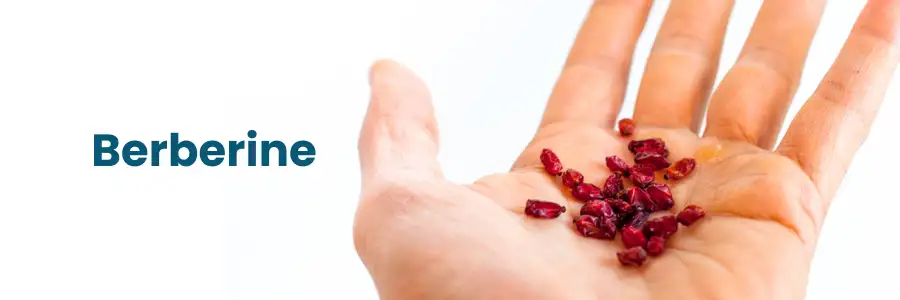- Cardiology 84
- Dermatology 45
- Endocrinology 33
- ENT 16
- Fertility 190
- Gastroenterology 78
- General-Medicine 81
- Gynecology 80
- Hematology 19
- Infectious-Diseases 33
- Neurology 52
- Oncology 34
- Ophthalmology 23
- Orthopedics 69
- Pediatrics 31
- Procedure 23
- Public-Health 144
- Pulmonology 59
- Radiology 8
- Urology 68
- Wellness 161
- Woman-and-child 77

Understanding Berberine: Benefits, Uses, and Considerations
Berberine is a bioactive compound extracted from various plants, including goldenseal, barberry, and Oregon grape. Traditionally used in Chinese and Ayurvedic medicine, this potent alkaloid has garnered attention for its broad spectrum of health benefits.
Secure your health with a second opinion. Make informed decisions and book your appointment today!
Get A Second OpinionBerberine Uses and Applications
Berberine has multiple uses that extend across various health domains. Its primary function is to activate AMP-activated protein kinase (AMPK), an enzyme that plays a crucial role in regulating metabolism.
- Metabolic Health: One of the most notable uses of berberine is its ability to manage blood sugar levels. It is particularly beneficial for people with type 2 diabetes. Studies suggest that berberine can lower blood glucose as effectively as metformin, a commonly prescribed medication for diabetes.
- Cardiovascular Benefits: Berberine exhibits potential in improving heart health. It helps lower cholesterol and triglyceride levels, reduces arterial plaque, and can decrease blood pressure. Its antioxidant properties further support cardiovascular function by neutralizing harmful free radicals.
- Anti-Inflammatory and Antimicrobial Effects: Berberine has demonstrated significant anti-inflammatory properties. Its antimicrobial activity makes it effective against various bacterial, fungal, and viral infections.
Berberine and Weight Loss
One of the secondary but increasingly popular uses of berberine is in weight management. Berberine supplementation has been linked to weight loss and improved body composition. By activating AMPK, berberine boosts metabolism and enhances fat burning. Furthermore, it improves the gut microbiome, which plays a critical role in weight management.
Berberine Benefits: A Closer Look
- Enhanced Insulin Sensitivity: Berberine significantly improves insulin sensitivity, making it a useful supplement for those with insulin resistance or type 2 diabetes.
- Improved Lipid Metabolism: It assists in reducing LDL cholesterol (the bad cholesterol) and increasing HDL cholesterol (the good cholesterol), thus promoting overall heart health.
- Antioxidant Support: The compound's potent antioxidant properties help combat oxidative stress, which is linked to chronic diseases and aging.
Berberine Rich Foods
While berberine supplements are widely available, certain foods can naturally boost its intake. These include:
- Barberry: Known for its vibrant red berries, barberry is rich in berberine.
- Goldenseal: This herb, often used for its medicinal properties, is another excellent source of berberine.
- Oregon Grape: The roots and bark of this plant contain high levels of the compound.
Berberine Supplements: What to Know
Berberine supplements come in various forms, including capsules and powders. When selecting a supplement, it's essential to choose a high-quality product with standardized berberine content. Dosage recommendations generally range from 900 to 1,500 mg per day, divided into three doses.
Berberine Side Effects and Considerations
Most people can safely take berberine, but you should know about potential side effects. These may be related to bowel movement disorders such as constipation, diarrhea or stomach cramps. Berberine should not be used by pregnant or breast-feeding women because it can cross the placenta and impact fetal development. It also has interactions with some medications, such as diabetes and hypotension drugs. It would therefore be wise to consult a healthcare provider before starting any supplement containing berberine.
Ready to take control of your health journey? Book your appointment now and start your path towards wellness today!
Book an AppointmentConclusion
In conclusion, berberine is a multifaceted compound offering numerous health benefits, ranging from improved metabolic health to cardiovascular support and weight loss. While berberine-rich foods provide a natural way to enhance its intake, supplements are a convenient option for those seeking higher doses. However, potential side effects and drug interactions necessitate a cautious approach and professional consultation.
Frequently Asked Questions
Berberine is a compound used for its potential benefits in managing blood sugar levels, improving cholesterol, and supporting digestive health. It's often used as a supplement for metabolic and cardiovascular issues.
Berberine is not commonly found in foods but is present in certain plants, including goldenseal, barberry, and Oregon grape. These plants are sometimes used in traditional medicine.
In Ayurveda, berberine is known for its anti-inflammatory and antimicrobial properties. It is often used in herbal formulations to support digestion and balance various bodily systems.
Doctors may be cautious with berberine due to its potential side effects, interactions with medications, and variability in supplement quality. More research is needed to fully understand its long-term safety and efficacy.
Disclaimer: The information provided herein is accurate, updated and complete as per the best practices of the Company. Please note that this information should not be treated as a replacement for physical medical consultation or advice. We do not guarantee the accuracy and the completeness of the information so provided. The absence of any information and/or warning to any drug shall not be considered and assumed as an implied assurance of the Company. We do not take any responsibility for the consequences arising out of the aforementioned information and strongly recommend you for a physical consultation in case of any queries or doubts.

- Cardiology 2132
- Dermatology 168
- Endocrinology 135
- ENT 97
- Fertility 217
- Gastroenterology 232
- General 478
- General-Medicine 1685
- Gynecology 169
- Hematology 85
- Infectious-Diseases 208
- Neurology 207
- Oncology 345
- Ophthalmology 65
- Orthopedics 187
- Pediatrics 83
- Procedure 72
- Public-Health 209
- Pulmonology 126
- Radiology 13
- Second Opinion 311
- Urology 294
- Wellness 600
- Woman-and-child 447
Related Blogs
If you have any questions, please fill out the enquiry form or call us, and we will get back to you promptly.
040-68334455